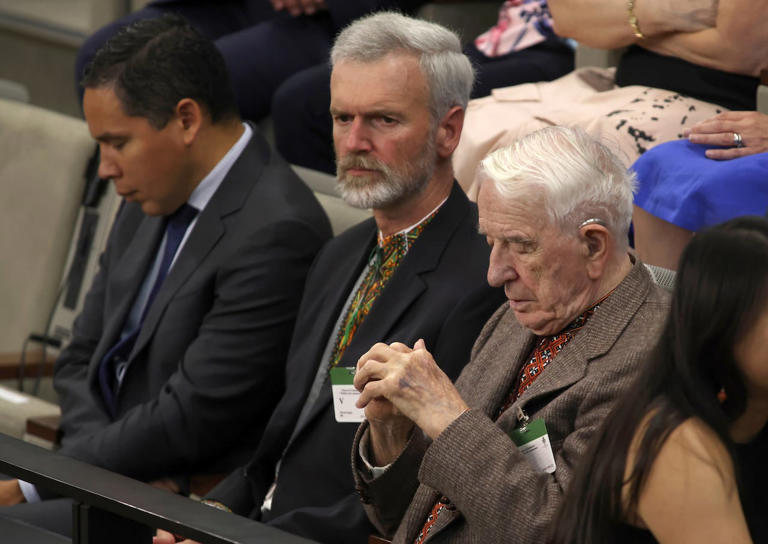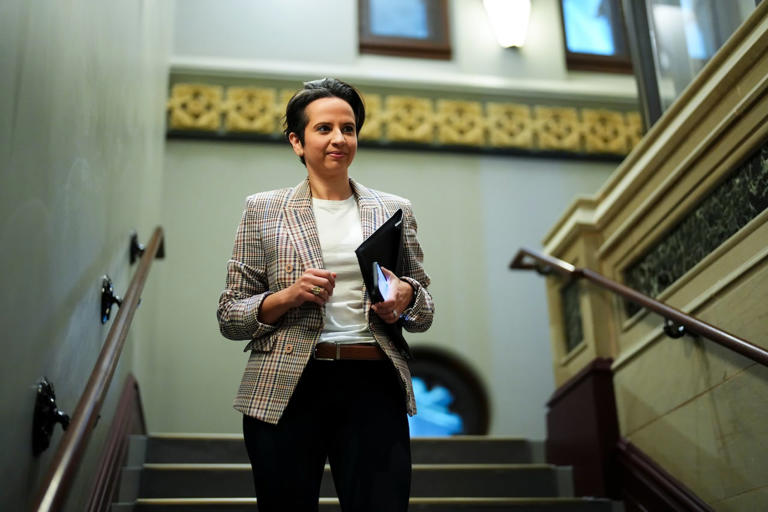Trudeau 'looking carefully' at releasing names of ex-Nazis in Canada
Governor General Mary Simon also said today Rideau Hall is sorry for honouring Peter Savaryn — a former chancellor of the University of Alberta who served in the same Nazi unit as Yaroslav Hunka — with the Order of Canada.
"We express our sincere apology to Canadians for any distress or pain his appointment may have caused," a spokesperson for Simon said.
The vice-regal office is also examining the Golden and Diamond Jubilee medals previously awarded to Savaryn, who also served as president of the Ukrainian World Congress, a group that represents the Ukrainian diaspora.
Struck by former prime minister Brian Mulroney, the Deschenes Commission's final report was released in 1986 and is composed of two parts.
The first, which included recommendations to make it easier to extradite war criminals, was released publicly. The second was marked secret and the names of alleged Nazis in Canada were never released.
Jewish groups, including B'nai Brith and the Friends of Simon Wiesenthal Centre (FSWC), have said the second part should be unredacted and disclosed publicly so that Canadians can learn more about the country's shameful history of admitting an untold number of Nazi collaborators after the Second World War.
They've said that in the wake of the Hunka affair — when a 98-year-old veteran of a Nazi unit was honoured in Parliament — Canada needs to reckon with questionable post-war immigration decisions that allowed Hunka and others like him to settle here and live in relative peace.
"There are top public servants looking very carefully into the issue, including digging into the archives," Trudeau told reporters. "We're going to make recommendations."
Reports suggest as many as 2,000 Ukrainian members of Hitler's Waffen-SS were admitted to Canada after the war — after some British prodding. The commission said the number is likely lower than that.
In an interview with CBC News, Michael Levitt, the president and CEO of the FSWC, said the country needs to know if thousands of war criminals were admitted to Canada.
"The expression 'sunlight is the best disinfectant' could not be more relevant to this situation. If there was ever an issue in Canadian history that requires disinfecting, it's our shameful record of covering up Nazi war criminal immigration to Canada in the 1940s and 50s," he said. "It's long overdue."
Asked if he had insight into why the government concealed details of post-war Nazi migration, Levitt said "the only way we're going to get the kind of answers we're looking for is for the unredacted files to be opened."
Quebec Liberal MP Anthony Housefather said it's a delicate issue because the government doesn't want to "bring pain to a lot of Eastern European communities."
Hunka, for example, has framed his war service as a fight for Ukrainian independence.
The unit he fought for, the 1st Galician division, is also memorialized by Ukrainian expatriate groups at different sites across the country.

Yaroslav Hunka, right, waits for the arrival of Ukrainian President Volodymyr Zelenskyy in the House of Commons in Ottawa on Sept. 22. (Patrick Doyle/The Canadian Press)© Provided by cbc.ca
They claim the Waffen-SS troops were fighting not to advance Hitler's racist and genocidal agenda but to push back against the totalitarian Soviet Union.
The Deschenes report has also concluded that allegations of war crimes committed by this division have "never been substantiated."
Related video: Trudeau reacts after India reportedly tells Canada to repatriate diplomats (The Canadian Press) Duration 0:45 View on Watch
That finding conflicts with what the post-war, Allies-led Nuremberg trials concluded about SS units like that one.
For that reason, Jewish groups say they want to see all that the Deschenes commission compiled to better understand its conclusions.
"We have to recognize we have a horrible past with Nazi war criminals. We opened our country to people after the war in a way that made it easier to come if you were a Nazi than if you were a Jew," Housefather said.
"We have to look at what the redactions are in the Deschenes report. I'm sure there's much of it that can be unredacted. We just need to find a consensus. You can't just willy-nilly say, 'Release everything,' because I don't know what's exactly there and there are privacy interests."
Housefather, who is Jewish, said he's been in contact with community groups and has brought their arguments back to his Liberal colleagues.
'History is history,' Tory MP says
Conservative MP Melissa Lantsman, the party's deputy leader, said Canadians need to know more about the country's "dark history" of "letting Nazis through the door to live here in peace and security."
Lantsman represents the Toronto-area riding of Thornhill, a riding with one of the country's largest Jewish communities.
In an interview with CBC News, Lantsman said the party supports revisiting the Deschenes report and its findings in some way.
"I think the victims of the Nazi regime, victims of the Holocaust — Jews, Poles — deserve answers. We have a past to reckon with and it's time we look at that past very seriously," she said. "We are going to support opening up the discussion."
Asked if it might be too painful for some communities to revisit alleged Second World War-era crimes, Lantsman said "history is painful but that doesn't mean we don't need to reckon with it."

Conservative Deputy Leader Melissa Lantsman walks through West Block on Parliament Hill in Ottawa on Tuesday, Sept. 19, 2023. (Sean Kilpatrick/Canadian Press)© Provided by cbc.ca
"It's unfortunate it took the government allowing a Nazi to come into this House to get us here," she said of former Speaker Rota's decision to invite Hunka to the Commons and celebrate him as a "Canadian hero."
But the Conservative caucus isn't united on the issue.
Quebec Conservative MP Gérard Deltell, Poilievre's environment critic, said Wednesday he's not open to revisiting the issue right now.
"I don't think so," he said when asked if the secret report should be released for all to read.
"I don't think it's the occasion to review it. At this time — I'm not there. I don't think it's time to review everything. History is history," he said.
Deltell said that as the son of a Canadian Second World War veteran, the ill-fated celebration of Hunka was a painful moment for him personally.
"I can't imagine what would have been his reaction to his son giving a standing ovation to a Nazi," Deltell said of his late father, who lived with German shrapnel lodged in his head until his recent passing.
NDP Leader Jagmeet Singh said he supports releasing the commission's report.
"We absolutely need to have more transparency," Singh told CBC News.
"We would support the calls for having more transparency around who was let in."
Green Party parliamentary leader Elizabeth May is also a proponent of reopening the Deschenes commission report.
In a media statement, May said it was "unquestionably very late" to be releasing these decades-old documents but it must be done.
"Apologies are not enough. We must atone for Canada's history of allowing Nazis to live here," May said.
No comments:
Post a Comment